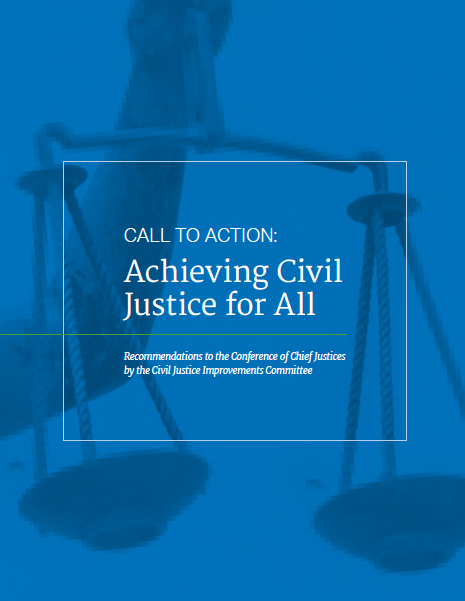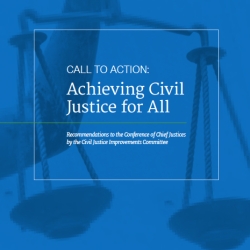A Call to Action in Our State Courts: Achieving Justice for All
 Over the last three years, I have had the privilege of chairing the Conference of Chief Justices’ Civil Justice Improvements Committee, whose recommendations were adopted last week by the Conference of Chief Justices and released today. The goal of this effort was to provide specific recommendations for how Chief Justices and Court Administrators in states across the country can address cost and delay in their state civil justice systems. The fact is, our state courts need to transform themselves and the way they deal with the public and the legal community if they are to continue to ensure access to justice in the 21st Century.
Over the last three years, I have had the privilege of chairing the Conference of Chief Justices’ Civil Justice Improvements Committee, whose recommendations were adopted last week by the Conference of Chief Justices and released today. The goal of this effort was to provide specific recommendations for how Chief Justices and Court Administrators in states across the country can address cost and delay in their state civil justice systems. The fact is, our state courts need to transform themselves and the way they deal with the public and the legal community if they are to continue to ensure access to justice in the 21st Century.
The final report, titled Call to Action: Achieving Civil Justice for All, offers an array of recommendations for state courts. Some recommendations are specific, narrow, and can be implemented immediately. Others, such as those relating to changing long-standing business processes or giving some case management duties to staff members rather than judges, may require training and other restructuring. Finally, others are meant to be transformational, such as the number one recommendation that courts take responsibility for managing civil cases from time of filing to disposition—thereby shifting the paradigm that the pace and process of civil litigation be driven by the litigants.
“At the core of the Committee’s Recommendations is the premise that the courts ultimately must be responsible for ensuring access to civil justice. Once a case is filed in court, it becomes the court’s responsibility to manage the case toward a just and timely resolution. When we say “courts” must take responsibility, we mean judges, court managers, and indeed the whole judicial branch, because the factors producing unnecessary costs and delays have become deeply imbedded in our legal system.”
While our courts are under greater pressure than ever given docket sizes, budget constraints, and a changing landscape of litigation that includes high numbers of self-represented litigants, at the same time there is a real danger of the business of the courts going away. Our civil courts are going through a time of great change. There are fewer civil cases, and almost no trials. A large caseload of criminal, juvenile, and family law cases continue to work their way through the courts, but if we still want to do the important civil work of resolving disputes, interpreting statutes, and protecting civil and economic rights, we need to modernize our courts to meet the needs of litigants in the 21st Century.
We recognize that the changes we propose will not be easy. They need to be guided by leadership from the top. We need education as we implement change. We need outreach to lawyers. We need to embrace organizational change management. Finally, we need a change in mindset. But, if we make the changes ourselves, we can control the outcomes and transform our courts to achieve civil justice for all.



